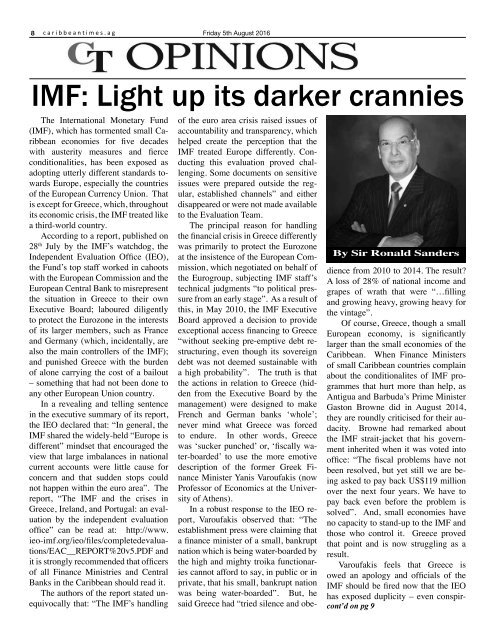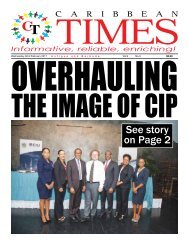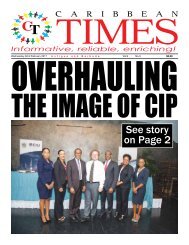Caribbean Times 65th Issue - Friday 5th August 2016
Caribbean Times 65th Issue - Friday 5th August 2016
Caribbean Times 65th Issue - Friday 5th August 2016
Create successful ePaper yourself
Turn your PDF publications into a flip-book with our unique Google optimized e-Paper software.
8 c a r i b b e a n t i m e s . a g<br />
<strong>Friday</strong> <strong>5th</strong> <strong>August</strong> <strong>2016</strong><br />
IMF: Light up its darker crannies<br />
The International Monetary Fund<br />
(IMF), which has tormented small <strong>Caribbean</strong><br />
economies for five decades<br />
with austerity measures and fierce<br />
conditionalities, has been exposed as<br />
adopting utterly different standards towards<br />
Europe, especially the countries<br />
of the European Currency Union. That<br />
is except for Greece, which, throughout<br />
its economic crisis, the IMF treated like<br />
a third-world country.<br />
According to a report, published on<br />
28 th July by the IMF’s watchdog, the<br />
Independent Evaluation Office (IEO),<br />
the Fund’s top staff worked in cahoots<br />
with the European Commission and the<br />
European Central Bank to misrepresent<br />
the situation in Greece to their own<br />
Executive Board; laboured diligently<br />
to protect the Eurozone in the interests<br />
of its larger members, such as France<br />
and Germany (which, incidentally, are<br />
also the main controllers of the IMF);<br />
and punished Greece with the burden<br />
of alone carrying the cost of a bailout<br />
– something that had not been done to<br />
any other European Union country.<br />
In a revealing and telling sentence<br />
in the executive summary of its report,<br />
the IEO declared that: “In general, the<br />
IMF shared the widely-held “Europe is<br />
different” mindset that encouraged the<br />
view that large imbalances in national<br />
current accounts were little cause for<br />
concern and that sudden stops could<br />
not happen within the euro area”. The<br />
report, “The IMF and the crises in<br />
Greece, Ireland, and Portugal: an evaluation<br />
by the independent evaluation<br />
office” can be read at: http://www.<br />
ieo-imf.org/ieo/files/completedevaluations/EAC__REPORT%20v5.PDF<br />
and<br />
it is strongly recommended that officers<br />
of all Finance Ministries and Central<br />
Banks in the <strong>Caribbean</strong> should read it.<br />
The authors of the report stated unequivocally<br />
that: “The IMF’s handling<br />
By Sir Ronald Sanders<br />
of the euro area crisis raised issues of<br />
accountability and transparency, which<br />
helped create the perception that the<br />
IMF treated Europe differently. Conducting<br />
this evaluation proved challenging.<br />
Some documents on sensitive<br />
issues were prepared outside the regular,<br />
established channels” and either<br />
disappeared or were not made available<br />
to the Evaluation Team.<br />
The principal reason for handling<br />
the financial crisis in Greece differently<br />
was primarily to protect the Eurozone<br />
at the insistence of the European Commission,<br />
which negotiated on behalf of<br />
the Eurogroup, subjecting IMF staff’s<br />
technical judgments “to political pressure<br />
from an early stage”. As a result of<br />
this, in May 2010, the IMF Executive<br />
Board approved a decision to provide<br />
exceptional access financing to Greece<br />
“without seeking pre-emptive debt restructuring,<br />
even though its sovereign<br />
debt was not deemed sustainable with<br />
a high probability”. The truth is that<br />
the actions in relation to Greece (hidden<br />
from the Executive Board by the<br />
management) were designed to make<br />
French and German banks ‘whole’;<br />
never mind what Greece was forced<br />
to endure. In other words, Greece<br />
was ‘sucker punched’ or, ‘fiscally water-boarded’<br />
to use the more emotive<br />
description of the former Greek Finance<br />
Minister Yanis Varoufakis (now<br />
Professor of Economics at the University<br />
of Athens).<br />
In a robust response to the IEO report,<br />
Varoufakis observed that: “The<br />
establishment press were claiming that<br />
a finance minister of a small, bankrupt<br />
nation which is being water-boarded by<br />
the high and mighty troika functionaries<br />
cannot afford to say, in public or in<br />
private, that his small, bankrupt nation<br />
was being water-boarded”. But, he<br />
said Greece had “tried silence and obedience<br />
from 2010 to 2014. The result?<br />
A loss of 28% of national income and<br />
grapes of wrath that were “…filling<br />
and growing heavy, growing heavy for<br />
the vintage”.<br />
Of course, Greece, though a small<br />
European economy, is significantly<br />
larger than the small economies of the<br />
<strong>Caribbean</strong>. When Finance Ministers<br />
of small <strong>Caribbean</strong> countries complain<br />
about the conditionalites of IMF programmes<br />
that hurt more than help, as<br />
Antigua and Barbuda’s Prime Minister<br />
Gaston Browne did in <strong>August</strong> 2014,<br />
they are roundly criticised for their audacity.<br />
Browne had remarked about<br />
the IMF strait-jacket that his government<br />
inherited when it was voted into<br />
office: “The fiscal problems have not<br />
been resolved, but yet still we are being<br />
asked to pay back US$119 million<br />
over the next four years. We have to<br />
pay back even before the problem is<br />
solved”. And, small economies have<br />
no capacity to stand-up to the IMF and<br />
those who control it. Greece proved<br />
that point and is now struggling as a<br />
result.<br />
Varoufakis feels that Greece is<br />
owed an apology and officials of the<br />
IMF should be fired now that the IEO<br />
has exposed duplicity – even conspircont’d<br />
on pg 9

















